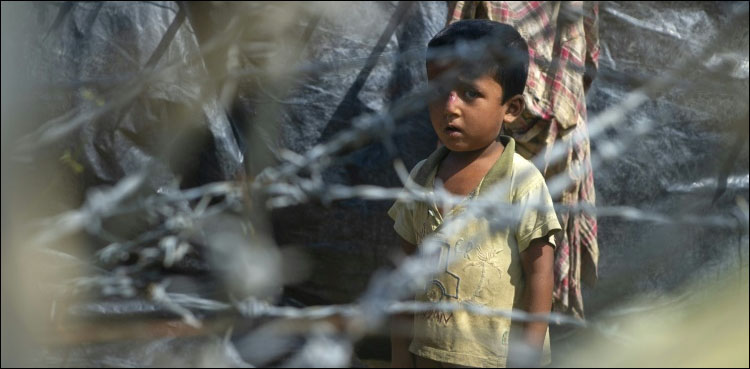YANGON: When Myanmar officials toured refugee camps in Bangladesh last month, inviting Rohingya Muslims who fled the country to return, they brought with them pamphlets adorned with cartoons showing hijab-wearing women passing through checkpoints and happily grasping identity cards.
They did not mention the new war being waged at home.
While the majority of Rohingya residents of northwestern Myanmar were driven out by a military campaign that began in August 2017, a scattered community of some 200,000 remained behind in Rakhine state, in villages that were spared the violence. Two years on, many of them are now trapped by a new conflict.
The worsening fighting has left Rohingya caught in the middle and facing threats making returns ever more unlikely.
“We are stuck in the middle of their fight,” said Tin Shwe, a villager from Buthidaung township, where clashes have been intense. “There has been no improvement of our lives over the past two years, only degradation. Only trouble.”
More than 730,000 Rohingya fled Rakhine to Bangladesh after Myanmar’s armed forces launched a crackdown.
United Nations’ investigators have said the army campaign included mass killings and gang-rapes and was carried out with “genocidal intent”.
On Thursday, a third attempt to begin the repatriation of 3,450 Rohingya cleared by the authorities to return to Myanmar failed when the refugees refused to go back.
Min Thein, director of Myanmar’s social welfare ministry, said security measurements were in place for returning refugees. “The Myanmar police force will guard them,” he said.
A military spokesman did not answer phone calls seeking comment.
INFORMATION BLACKOUT
Authorities have shut northern Rakhine off from journalists and most humanitarian agencies, and imposed an internet blackout since late June, citing the need to avert unrest.
The restrictions make information difficult to verify, but Reuters spoke to a dozen Rohingya still in central and northern Rakhine and refugees in Bangladesh with relatives who stayed behind.
Some described landmine blasts and shells falling in Muslim villages, as well as intimidation from combatants.
Two told Reuters they would flee to Bangladesh if they could, but routes out of the country used during the previous exodus have been rendered unsafe by the violence.
More than 1,000 Rohingya have arrived in the camps in Bangladesh since January, according to the United Nations refugee agency, a figure that also includes arrivals from India, which has in recent months been cracking down on what it says are illegal Rohingya immigrants.
Those from Myanmar cited violence linked to fighting between Arakan Army insurgents and the military as well as poor living conditions, spokeswoman Louise Donovan said.
Many refugees living in the crowded Bangladesh camps say they want to return home, but under specific conditions, including guarantees of citizenship and security and improvements in the lives of Rohingya still in Myanmar.
Denigrated as illegal immigrants, although many can trace their ancestry in Myanmar back centuries, the Rohingya there are mostly denied citizenship and subject to tight restrictions on movement that keep them confined to camps and villages.
AID SHORTAGES
Many Rohingya in Myanmar have been reliant on international non-profit organizations for medical care and deliveries of food since a previous bout of violence in 2012 that forced many into camps.
In Rathedaung’s Sin Khone Taing village, Rohingya said they last received a delivery of food in May. “People are living off rice porridge,” said one villager.
Kyaw Win, executive director of Burma Human Rights Network, which monitors the Rohingya crisis, said it had received reports of landmines and improved explosive devices placed on the roads near the exits of Rohingya villages.
In a joint statement last week, 61 NGOs including Save the Children and Oxfam said there had been “no meaningful progress on freedom of movement or human rights” for the Rohingya still in Myanmar, while the recent “upsurge in violence has worsened the already precarious humanitarian situation in central and northern Rakhine state”.
Across the border, in the sprawling Bangladesh camps, refugees keep in touch with their relatives in Myanmar via phone, now that the internet connection has been cut. Nobody is urging them to come home.
“All of the people want to flee as there is no security,” Tin Shwe said. “The government cannot help the few Rohingya left behind. So how could anyone believe they could help hundreds of thousands?”



Leave a Comment